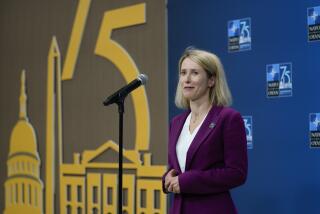Estonia Declares Its Independence : Baltics: In neighboring Latvia, Soviet troops disarm prime minister’s guards and seize broadcast stations.
- Share via
TALLINN, Soviet Union — The Parliament of the breakaway Baltic republic of Estonia declared immediate full independence from the Soviet Union on Tuesday and said parliamentary elections would be held next year on the basis of a new constitution.
There were no reports of confrontations in the republic despite apparently large Soviet military movements in the capital of Tallinn. But in neighboring Latvia, Soviet troops disarmed the prime minister’s guards and seized broadcast studios, and tensions remained high throughout the rebellious region which has been in the forefront of national independence movements.
The Estonian action occurred during a late-night session in the republic’s barricaded Parliament building in Tallinn’s old town, where deputies voted unanimously for the declaration, Foreign Ministry spokeswoman Eve Tarm said.
“The proclamation of independence is a challenge to the enemies of perestroika and the enemies of world peace and democracy,” deputy Heinz Valk reportedly told Parliament.
Estonia, which like Latvia and the third Baltic republic, Lithuania, was incorporated into the Soviet Union in 1940, last year declared sovereignty and said it was entering a transition phase--including talks with the Kremlin--that would eventually lead to independence.
But deputies said Tuesday that the overthrow of Soviet President Mikhail S. Gorbachev by right-wingers meant the republic could not restore its prewar independence through talks with central authorities.
“The coup in Moscow has given us a chance comparable to that in 1918” when the republic broke away from civil-war-torn Russia to enjoy its generation of independence, the Estonian news agency ETA quoted Valk as telling Parliament.
“It is essential for Estonia to seek international recognition at this very difficult moment,” deputy Enn Puldroos said after Parliament voted 69 to 0 in favor of the declaration.
Communists in the 105-member chamber did not vote, and leading Estonian Communist deputy Vladimir Lebedev warned that passing the resolution now could provoke military action in the republic, Tarm said.
But local leaders said army troops based in the city had indicated that they would not use force if ordered to do so by the new Soviet leadership.
Earlier Tuesday, 66 tanks and 40 military vehicles entered Tallinn but there were no reported incidents.
Heavy trucks, some carrying slabs of concrete and stones, were parked around the republic’s television and radio stations, while stone barricades on streets around Parliament were reinforced.
Parliament declared that a constituent assembly made up of deputies and members of the Congress of Estonia, which represents citizens’ groups, would draw up a new constitution, but did not say when this would be.
Latvia, Estonia and Lithuania began independence drives last year that have been inspirational to other secessionist Soviet republics but a source of friction between hard-liners and reformers in the Kremlin.
The hard-line junta that ousted Gorbachev from power on Monday swiftly moved to isolate and militarize the region, seizing control of harbors and broadcasting stations.
Gen. Fyodor Kuzmin, the top Soviet military commander for the Baltic region, declared himself the de facto ruler of the three republics.
A report Tuesday said two people in Latvia were wounded by Soviet troops, but gave no other details. On Monday, the driver of a minivan was reported shot and killed by soldiers in Latvia after driving into an off-limits zone.
Efforts to intimidate Latvian Prime Minister Ivars Godmanis began late Tuesday when he received an anonymous phone call telling him to leave his office, said Martin Squinsh, duty officer of the Latvian mission in Moscow.
Godmanis ignored the first call, said Squinsh, but shortly before midnight he received another, this time from Kuzmin, who asked him to receive an envoy who would be collecting “unnecessary weapons.”
Soldiers then arrived in armored personnel carriers, disarmed all of Godmanis’ guards, arrested the prime minister’s security chief and departed, said the official.
The episode came after the Latvian government issued a resolution declaring it a crime to obey laws set down by the coup leaders or the military.
Its Parliament also threatened to call a general strike if Soviet forces did not abandon occupied buildings by 6 a.m. today (8 p.m. PDT Tuesday), Latvian Foreign Minister Janis Jurkans said in Copenhagen, Denmark. It was not immediately clear whether workers had indeed struck.
Soviet special forces also raided the headquarters of the People’s Front of Latvia, a grass-roots political group fighting for the republic’s independence, the Russian Information Agency reported from Riga.
Gorbachev’s ouster came one day before the scheduled signing of a new Union Treaty redefining relations between the central Soviet government and its restive republics. The signing has been postponed indefinitely.
The Baltic republics, as well as the southern states of Moldova and Georgia, had refused to sign the document, saying they wanted complete independence.
Last year, Estonia and Latvia adopted a step-by-step approach to regaining independence, starting with a declaration of sovereignty, while Lithuania declared full immediate independence.
The Kremlin responded with a crippling 10-week economic blockade which forced Lithuania to freeze its declaration. Since then, Baltic efforts to negotiate their independence with Moscow have made little progress.
More to Read
Sign up for Essential California
The most important California stories and recommendations in your inbox every morning.
You may occasionally receive promotional content from the Los Angeles Times.













